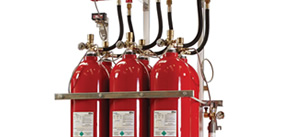Protecting Irreplaceable Assets with Pre-Action Sprinkler Systems
All businesses must protect their company’s assets. Pre-action sprinklers offer fire protection for areas containing high value equipment or contents and spaces which are highly sensitive to the effects of accidental sprinkler water discharge. In pre-action systems, the primary control valve for pre-action is activated by a fire detection device, and not by exclusive operation of a sprinkler head in the system piping. This may allow enough time to extinguish the fire manually, avoiding a system discharge.
There are two different types of pre-action sprinklers. Single interlock and double interlock systems are used depending upon the coverage needed and the purpose for which the system is intended. A single interlock system operates similarly to a dry pipe system. This system has a single event that must occur before water will run into the system. This event is the detection of a fire from a heat or smoke detector where the pre-action valve is opened.
A double interlock system, on the other hand, requires two events to take place. First, the detection of fire from a heat or smoke detector and second, the automatic sprinkler operation. Once both actions have occurred, the pre-action valve operates which allows water into the system piping. These systems are particularly useful for areas such as data centers and other information sensitive environments where unintended activation could cause significant damage. Reliable Fire & Security offers installation, inspection and maintenance services of pre-action detection and controls. We have a complete line of pre-action flow and tamper switches.
We represent Notifier brand pre-action control panels and devices and can manage your pre-action system with a turnkey factory trained crew. The NFPA Standard #25 covers the maintenance and testing of pre-action systems. An automatic service plan through Reliable Fire & Security can help prevent costly maintenance repairs.
Applications include:
- Computer Rooms
- Data Storage Rooms
- High-Hazard Installations Using Water as Extinguishing Agent
- Telecommunication Facilities

